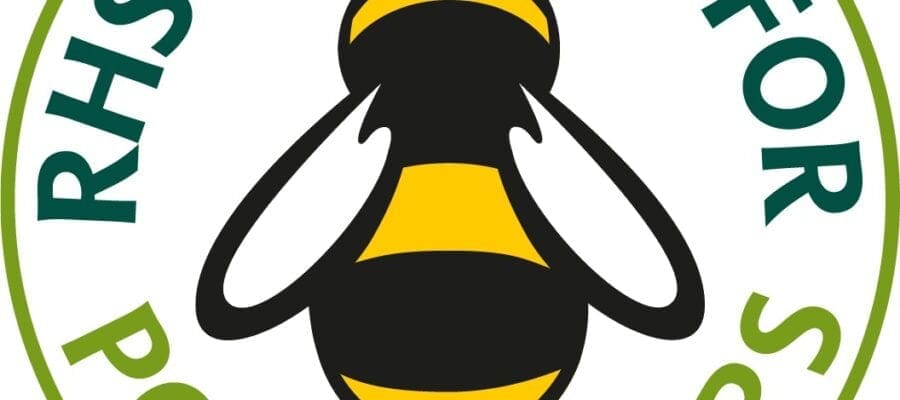Our latest Subs Club article, for KG subscribers only, highlights several ways in which people can stand up for treasured wild species.
Plants for pollinators: perfection not promised
The RHS has announced that it is changing the name of its ‘Perfect for Pollinators’ logo scheme to ‘Plants for Pollinators’ (pictured above). The logo was launched in 2011, so that retailers could show gardeners which plants were best for bees and other pollinating insects, but came under fire last year after Professor Dave Goulson of Sussex University found that some plants carrying it contained potentially dangerous levels of pesticides.
A statement from the RHS says: “While the RHS encourages responsible growing practices, it cannot, as a charity, police how hundreds of thousands of plants are grown each year within the horticultural trade. Rather than get rid of the brand altogether – which would undermine efforts to boost pollinator numbers – it was decided to change the name to Plants for Pollinators; showing gardeners those flowering plants that are attractive to pollinators without commenting on the way in which they have been grown.”
Enjoy more Kitchen Garden reading in the monthly magazine.
Click here to subscribe & save.
Nick Rau of Friends of the Earth says: “The RHS ‘plants for pollinators’ label provides an indispensable guide to the best plants for pollen and nectar. But gardeners need to have confidence that the plants they are buying aren’t doing more harm than good, which is why it’s also good to see the RHS promoting pesticide reduction. We now need the industry to step up and work to remove bee-harming pesticides from across the global supply chain.”
Find out more – including a list of organic nurseries – at https://www.rhs.org.uk/science/conservation-biodiversity/wildlife/plants-for-pollinators
‘Nitrogen guzzlers’ crowd out delicate blooms
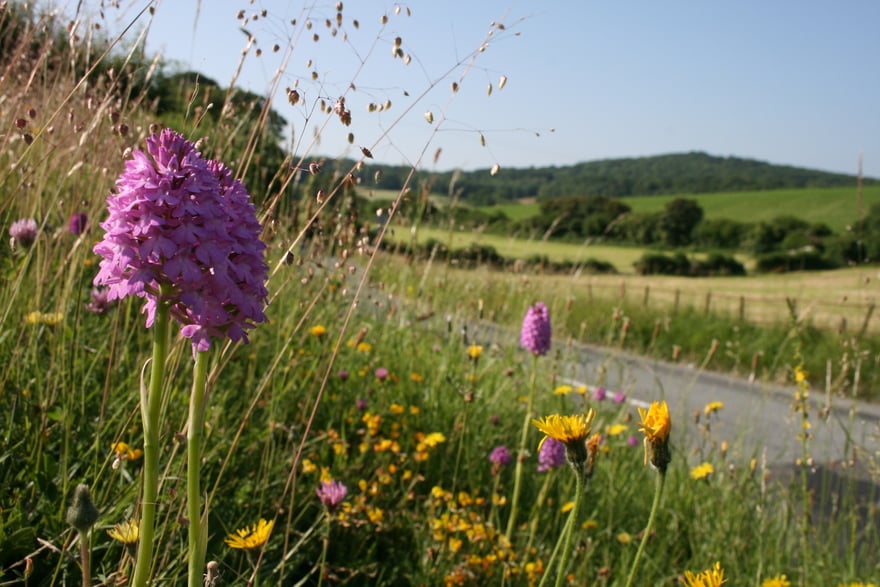
Verging on perfection: Orchids on a Dorset verge. Picture: Dominic Murphy/Plantlife
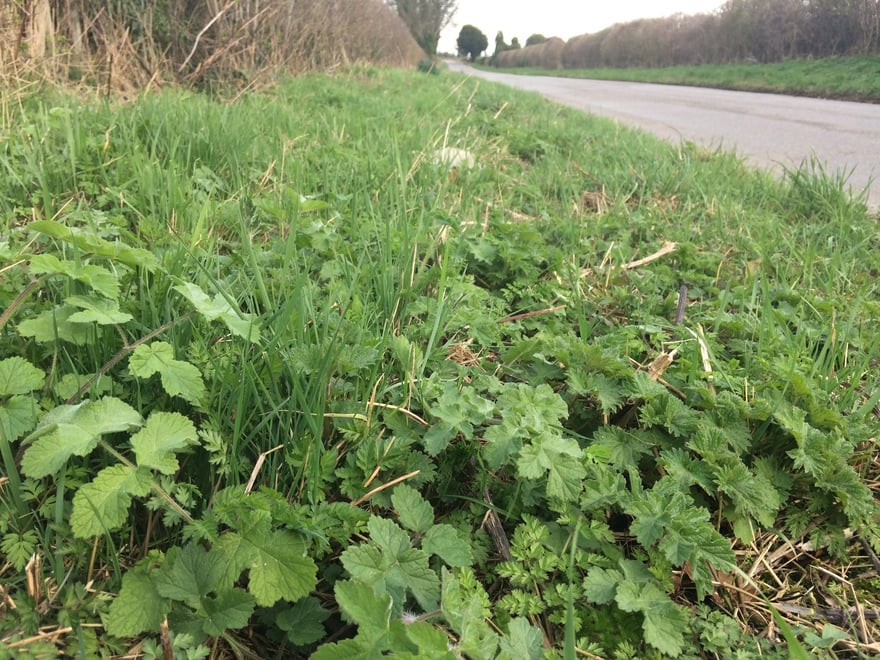
Verging on dismal: A ‘mean green’ verge with hogweed, nettle, cow parsley and cocksfoot. Picture: Trevor Dines/Plantlife
A small group of invasive native plants are thriving on a ‘junk food’ diet and taking over our once flower-rich verges, says plant conservation charity Plantlife. It says that air pollution and poor management have caused a 20% drop in diversity on road verges, but that better management could have spectacular results for wildflowers and wildlife, delivering an estimated 400 billion more blooms.
Almost 90% of Britain’s wildflowers prefer lower-nutrient soil, so are being crowded out as a result of air pollution creating unnaturally rich conditions. Analysing trends since 1990, Plantlife found that plants that enjoy soil rich in nitrogen – much of it deposited from vehicle exhausts – are spreading rampantly. ‘Nitrogen guzzlers’ like stinging nettle, bramble, rough meadow-grass, cow parsley, Yorkshire fog and creeping buttercup are crowding out species including tufted vetch, bugle, tormentil, red clover, lady’s bedstraw, white campion and greater knapweed.
Plantlife botanical specialist Dr Trevor Dines says: “Our once colourful and botanically diverse road verges are becoming mean, green thickets where only thuggish species can thrive and more delicate flowers are being driven to the brink of extinction.
“The destructive impact of air pollution on human health is well documented but how pollution affects plantlife remains under-appreciated: vehicle exhausts can result in up to 2.5kg of nitrogen per mile per year being dumped on our road verges – a rate that only a fraction of our wildflowers can cope with. Poor management has combined with pollution to create a perfect storm. Not only have councils adopted an over-eager regime that sees flowers cut down before they can set seed, but the mowings left on the verge simply add to the soil richness.”
Plantlife’s vision for Britain’s verges is to manage them for wildlife as a matter of course, while keeping them safe for motorists. It says that simple changes, like cutting less and later in the year, can significantly improve the biodiversity on our verges.
Dr Dines says: “If all our verges were managed for nature we would see an area the size of London, Birmingham, Manchester, Cardiff AND Edinburgh combined adorned with wildflowers. This surge in pollen and nectar would have a genuinely transformative effect on the prospects of wildlife – half of which we have tragically lost in the past 50 years alone.”
Find out more and add your name to Plantlife’s petition calling for better roadside management at https://www.plantlife.org.uk/uk/about-us/news/road-verge-marauders
Pest-resistant wild tomato found
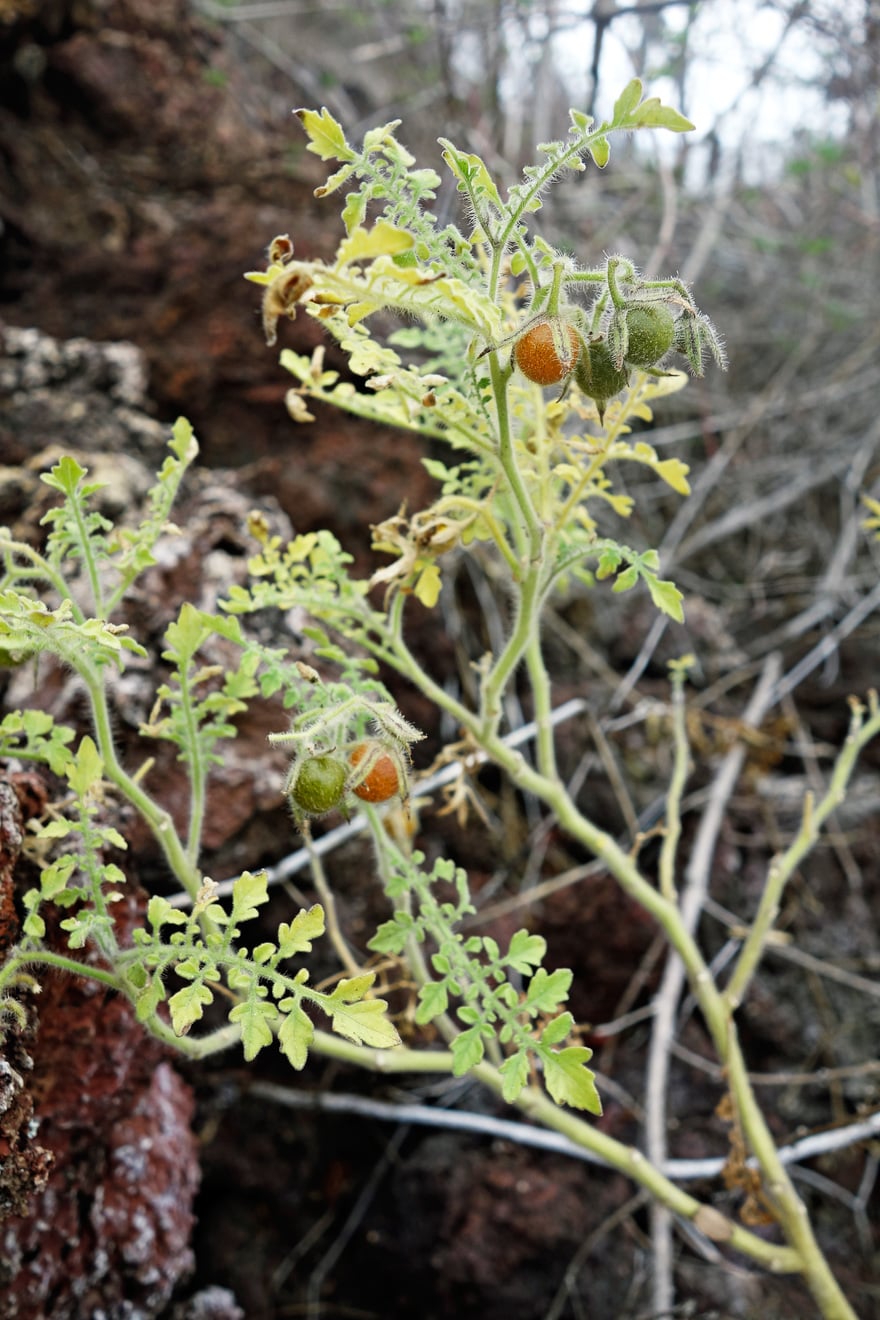
Resilient: The Galapagos tomato in fruit. Picture: Kevin Gepford
A wild tomato species from the Galapagos Islands has been found to be resistant to a wide range of insect pests. Researchers from Wageningen University in Holland say that because this species is closely related to the cultivated tomato, this resilience will be easier to interbreed into cultivated species.
The process of breeding modern tomatoes has resulted in the loss of much of their natural pest and disease resistance, so plant breeders have been working to reintroduce resistance from wild tomato species. The problem is that most of these plants are very distant relatives, and scientists have yet to successfully interbreed the required traits. The wild tomato from the Galapagos Islands, however, is genetically very similar to the cultivated tomato. Moreover, its resistance is coded within a single chromosome, which should make cross-breeding much easier.
“We have been busy with this research since 2010,” says Ben Vosman of Wageningen University and Research. “The first discovery was that this tomato species is resistant to whiteflies. Then it turned out that it is actually resilient to a lot of other insects too, including the green peach aphid and caterpillars of the beet armyworm. That was a very pleasant surprise.
“If we can make cultivated tomatoes resistant to whiteflies, this will directly benefit the environment,” says Vosman.
Find out more at https://www.wur.nl/en/newsarticle/Close-relative-of-the-cultivated-tomato-is-resistant-to-many-insects.htm?wmstepid=mail_de_auteur
Go wild in June!
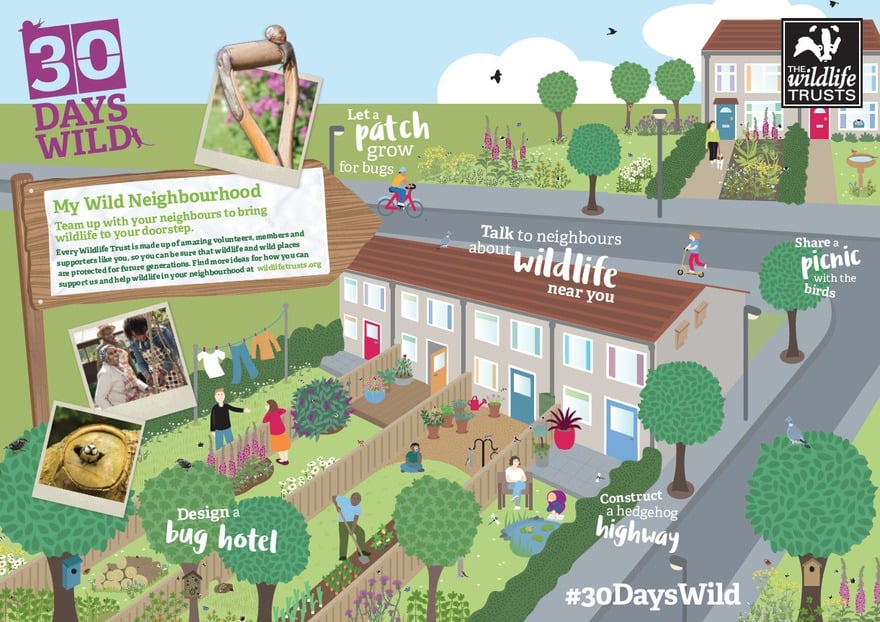
The Wildlife Trusts are challenging people to do something nature-related every day throughout June – that’s 30 small but inspiring Random Acts of Wildness. Families, schools and workplaces are all encouraged to take part and more than 54,000 people have signed up so far.
The Wildlife Trusts are giving away free packs including a wallchart, a poster, an interactive booklet and stickers, to give you ideas for going wild through June – and beyond! – and help you plan your month and track your progress. You’ll also get emails offering ideas and inspiration from your local Wildlife Trust, and invitations to exclusive events – and you’re asked to share your Random Acts of Wildness on social media using #30DaysWild.
Find out more and get involved at http://action.wildlifetrusts.org/page/20877/petition/1
Pollinator pathways planned
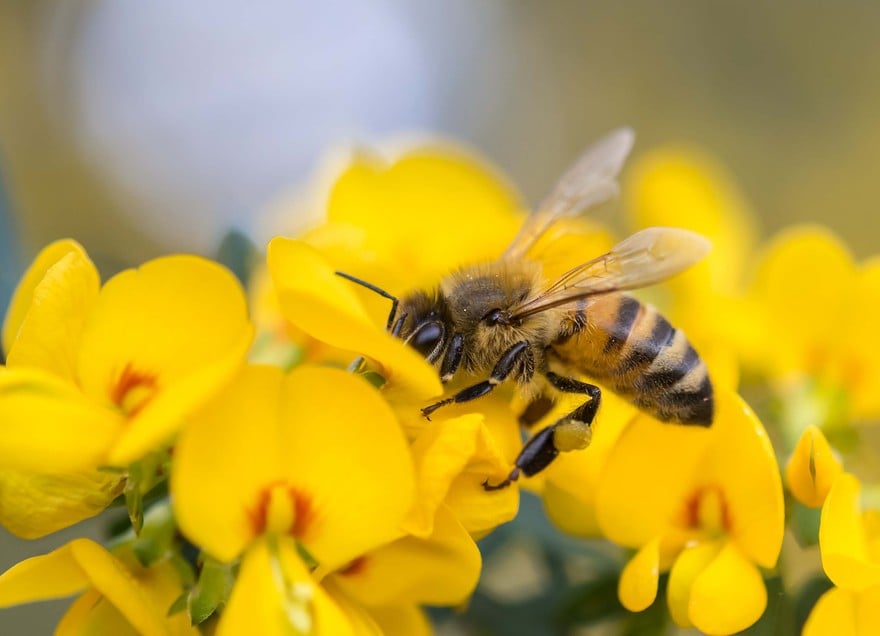
Making a bee-line: helping our pollinating friends to survive and thrive
A ‘road network’ for insects could be created across Britain if a bill presented to the House of Commons in May becomes law. The Protection of Pollinators Bill aims to create a national network of flower-rich pollinator corridors. It would place a duty on the Department of the Environment and Rural Affairs (Defra) to approve an English ‘B-Line’ map, and would encourage public authorities to help with its fulfilment.
Wildlife charity Buglife and more than 150 partners have developed a national B-Lines map of flower-rich pathways to reconnect the best of our remaining wildflower habitats. Around 97% of wildflower grassland has been destroyed since the 1940s, and more than two-thirds of Britain’s pollinators are currently in decline.
New measures could include turning over farmland or waste ground to wildflower meadows, rewilding roadside verges, and abandoning the mowing of public grassland to encourage the growth of insect-friendly plants. The Ministry of Justice and the Environment Agency are already working with Buglife to identify sites, such as prisons, seawalls and floodplains, where they could create wildflower habitats.
“Creating wildlife sanctuaries and protecting our green space will not only support our bees and insects, it will also have other positive outcomes for everything else,” said Ben Bradley MP, introducing the bill in parliament. “It will have a beneficial impact on our local communities and on our individual mental health and wellbeing. Green spaces are places of tranquillity and provide a space away from the hustle, bustle and stresses of modern life.” The bill will have its second reading in October.
Find out more at https://www.buglife.org.uk/b-lines-hub
 Enjoy more Kitchen Garden reading in the monthly magazine. Click here to subscribe.
Enjoy more Kitchen Garden reading in the monthly magazine. Click here to subscribe.
Sign-up to the Kitchen Garden Magazine Newsletter
Enter your e-mail address below to see a free digital back issue of Kitchen Garden Magazine and get regular updates straight to your inbox…
You can unsubscribe at any time.
About the Author
- The Cottage Garden Society ‘Grow In Pots’ For The Malvern Show 9-12 May - 12th April 2024
- Arundel Castle’s Tulip Festival returns - 7th February 2024
- FREE TREES FOR SCHOOLS - 4th January 2024

